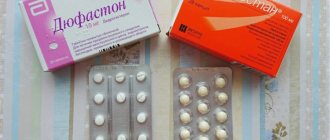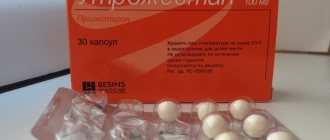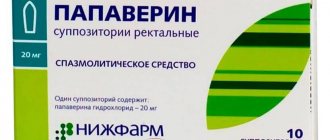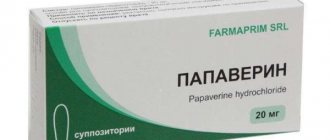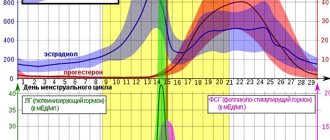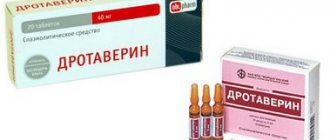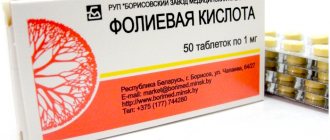Indications for use of Papaverine
The drug Papaverine hydrochloride has an antispasmodic effect and affects the smooth muscles of the abdominal organs, breathing, blood vessels and the genitourinary system.
Does not affect myocardial contractility, reduces the excitability of the heart muscle. It has a hypotonic, sedative and analgesic effect. The medication is prescribed by a doctor to relieve spasms in spastic colitis, pylorospasm, cholecystitis, renal colic, migraine, bronchospasm, angina, etc.
In the form of suppositories, it is used in pregnant women to reduce nagging pain during false and true contractions.
The medicine is prescribed depending on the indications in the form of suppositories, injections or tablets. When used, drowsiness, decreased blood pressure, weakness, and a feeling of double vision are possible.
The dosage and frequency of use are selected by the doctor depending on the indications and the severity of the condition.
Can be used in a lytic mixture or triad to reduce high body temperature. To do this, papaverine, analgin (metamizole sodium) and diphenhydramine are administered or drunk.
The instructions do not indicate how best to use - before or after meals. This does not affect the effectiveness or incidence of side effects.
Can Papaverine suppositories be used by an expectant mother?
Papaverine rectal suppositories are the most popular doctor’s prescription for uterine hypertonicity
Although Papaverine hydrochloride is actively prescribed by gynecologists to pregnant women for both outpatient and inpatient treatment, the instructions for the drug interpret its use during gestation (bearing a child) ambiguously. According to the recommendations provided by the manufacturer, the safety of using Papaverine by expectant mothers has not been established. Of course, this circumstance, combined with a doctor’s prescription that has already been received, will confuse a woman who is conscious about the use of medications during pregnancy.
It should be noted that clinical studies of the effectiveness and safety of the use of the drug Papaverine in pregnant women have not really been conducted. Nevertheless, the long-term practice of using Papaverine clearly demonstrates its positive effect on the course of pregnancy and, at the same time, complete safety for the fetus.
Papaverine suppositories are prescribed at any stage of pregnancy if a woman has or is suspected of having the following conditions:
- Uterine hypertonicity is the most common diagnosis made during pregnancy. Hypertonicity is tension in the myometrium (the muscular layer of the uterus), which can occur for a number of reasons (stress, excessive physical activity, hormonal reasons, etc.) and can lead to premature termination of pregnancy.
- Arterial hypertension - a persistent increase in blood pressure - is a fairly common phenomenon in late pregnancy.
- Colic (liver, kidney, intestinal, etc.) is sudden, cramping pain caused by muscle spasm.
- Bronchospasm is a pathological narrowing of the bronchi.
- Severe increase in body temperature (in such cases, Papaverine is used as part of a lytic mixture).
The doctor talks about uterine hypertonicity - video
Papaverine can also have a positive effect on constipation if it is caused by muscle spasms (spastic constipation). For atonic constipation, which is caused by a decrease in intestinal muscle tone, Papaverine will only worsen the situation.
The drug Papaverine is produced in several pharmaceutical forms:
- solution for injections;
- rectal suppositories;
- pills.
During pregnancy, Papaverine is most often prescribed in the form of suppositories. This form has a number of advantages:
- convenience and versatility of independent use by a woman;
- complete and rapid absorption of the drug through the rectum;
- increased therapeutic effect due to the proximity of the uterus.
Each Papaverine rectal suppository contains 20 mg of active ingredient.
Characteristics of the drug No-shpa
Dosage form: tablets and solution for injection. The active substance in the composition is drotaverine hydrochloride. It acts by inhibiting the activity of PDE. As a result, muscles and blood vessels relax. During therapy, the concentration of calcium ions decreases. When taken orally, the effect develops within 15-20 minutes, and when administered intravenously or intramuscularly, within 5 minutes. The antispasmodic effect lasts up to 3-4 hours.
Used for pain caused by diseases of the biliary tract, female genital area, gastrointestinal tract, and genitourinary system. It is forbidden to start treatment if there is severe insufficiency of heart, liver or kidney function. Contraindicated in patients with low blood pressure, allergies to components, or during breastfeeding.
The medicine is available in the form of tablets, rectal suppositories, and solution for injection. The active ingredient is papaverine hydrochloride. The substance inhibits the action of phosphodiesterase and lowers calcium levels. As a result, the smooth muscle structures of various organs relax: the gastrointestinal tract, genitourinary and respiratory systems.
Papaverine has a pronounced hypotensive effect and promotes vascular relaxation.
Indications for use are:
- inflammation of the gallbladder;
- contraction of the pylorus of the stomach;
- spastic colitis;
- acute circulatory disorder in the kidney;
- disease of the arteries with complete closure of their lumen;
- constriction of blood vessels in the brain;
- narrowing of the bronchi.
The drug is used when there is a lack of blood supply to areas of the heart. The product dilates coronary vessels, eliminates pain, and promotes relaxation of smooth muscles. Contraindicated for use with glaucoma, AV block, allergies to components, breastfeeding, severe renal failure, and in old age. It is necessary to limit intake in case of kidney disease, hypothyroidism, heart rhythm disturbances, and prostate hyperplasia.
Before using drugs, you need to become familiar with their effect on the body. The composition contains different components, so the onset of action and its duration differ. The difference is also in the manufacturer and price.
Similarities
Both drugs have antispasmodic and vasodilating effects and reduce smooth muscle tone.
Muscles and blood vessels relax. Means are intended for symptomatic treatment. Available in injection and tablet forms. You can buy it at the pharmacy without a prescription from a doctor.
What is the difference
Papaverine is a Russian drug. It is produced by such manufacturers as NIZHFARM OJSC, Novosibkhimpharm OJSC, Biosintez OJSC, Pharmstandard-Tomskkhimpharm OJSC. The foreign analogue is produced in Hungary. No-spa is a more advanced product that contains drotaverine hydrochloride.
The drug has a pronounced antianginal effect, unlike papaverine hydrochloride. As a result of intake, the heart muscle is better saturated with oxygen and blood flow to the heart increases. Unlike its analogue, it is excreted not only by the kidneys, but also half with the intestinal contents. It is safer to take drotaverine during pregnancy and childhood.
Which is cheaper?
Papaverine is cheaper. The price for 20 pieces is 30 rubles, and for 10 candles – 80 rubles. The cost of 10 ampoules is 70 rubles. You can buy the analogue in tablets for 115 rubles. The injection form costs 95 rubles. for 5 ampoules.
PAPAVERINE and NO-SPA belong to the class of so-called antispasmodics of myotropic action, that is, they reduce the tone of the smooth muscles of the internal organs, reduce their motor activity, moderately dilate the blood vessels and thus eliminate the increased tone of the muscle organ.
It must be said that in terms of severity and duration of antispasmodic (relaxes smooth muscles) action, NO-SPA is superior to PAPAVERINE.
Many characteristics of NO-SHPA are superior to those of PAPAVERINE, and it is for this reason that most companies (after the end of the patent protection period of the original drug) today produce drotaverine hydrochloride under their own names. But not everyone succeeded in creating a complete analogue of NO-SPE.
NO-SPA is 3-4 times more effective than PAPAVERINE, and is also characterized by higher bio-availability, which is about 100%, i.e. Almost 100% of the drug “works”. When taken orally, NO-SPA is rapidly absorbed. The PAPAVERINE compound is poorly soluble in an aqueous environment; it is used mainly intravenously (intramuscularly) or rectally in suppositories (this is how the drug is prescribed to pregnant women for direct entry into the bloodstream through the vessels of the rectum).
Many pregnant women carry NO-SHPA tablets with them everywhere and take them at the slightest discomfort. These actions are justified if you feel a feeling of tension in the uterus or pain in the lower abdomen, but taking pills on your own should in no case replace seeing a doctor: the pill acts as an “ambulance” before seeing a doctor.
The effect of NO-SHPA begins very quickly - already 10-12 minutes after taking the tablet and 3-5 minutes after intramuscular administration. Also, when administered intravenously, the effect of NO-SHPA manifests itself somewhat faster - after 2 - 4 minutes, and the maximum effect develops after 30 minutes. The effect of PAPAVERINE is more delayed (with intravenous administration, the effect develops after 5-10 minutes).
From the history of medicinal drugs
PAPAVERINE (its full name is papaverine hydrochloride) was developed and obtained earlier than NO-SPA - in the 50s. At the same time, several global companies began to produce it, each from its own pharmaceutical raw materials.
The creator of NO-SHPA is (Hungary). The history of the creation of the drug began with the development by a research group of a method for the industrial production of PAPAVERINE. A new compound, drotaverine hydrochloride (trade name NO-SPA), was synthesized in the plant’s laboratory in 1961. Subsequently, pharmacologists of this pharmaceutical
companies constantly improved the raw materials from which the drug was prepared, and today NO-SPA has some advantages over PAPAVERINE. Now, where NO-SPA is produced, it is part of the pharmaceutical industry. Thus, NO-SHPA is the original trademark of this company.
In other indicators, PAPAVERINE and NO-SPA are similar. Both of these drugs have no effect on the nervous system. They combine well with analgesics - painkillers, which, if necessary, allows for combination therapy, complementing the antispasmodic effect with the analgesic effect of the analgesic. The following analgesics are used in combination with them: PARACETAMOL, acetylsalicylic acid, IBUPROFEN, DICLOFENAC.
In some cases, PAPAVERINE and NO-SHPU are prescribed together: in the morning and during the day, the woman takes NO-SHPA tablets, and at night she administers suppositories with PAPAVErine. Other prescription options are possible; they depend on the situation and the doctor’s preferences, based on his professional experience.
During pregnancy and breastfeeding, the safety and effectiveness of papaverine hydrochloride have not been established. But there is also no clear data against him. Therefore, it continues to be used (including from Russia). NO-SPA has a slightly higher safety profile, so it can be taken even during pregnancy.
Thus, according to the Hungarian Committee for the Control of Random Developmental Anomalies, of the 30,663 women who participated in the study (1980 - 1991), 9.5% took NO-SPU during pregnancy (due to the threat of its termination within 2 3rd and 3rd months or due to the threat of premature birth in the last month of pregnancy).
We must not forget that even such proven drugs have contraindications and side effects.
You should not use PAPAVERINE and NO-SHPU if you are hypersensitive or allergic to the drug. For some lung diseases (bronchial asthma, severe bronchitis) and heart rhythm disorders, they should be taken with caution and under the supervision of a doctor.
Possible side effects: drowsiness, nausea, dizziness, palpitations, feeling hot, increased sweating, constipation. With rapid intravenous administration, as well as when used in high doses, cardiac arrhythmias may develop. True, these side effects are quite rare (especially with NO-SHPA).
Concluding the conversation about antispasmodics, it is necessary to warn expectant mothers against self-medication with these two drugs, which can be found in any pharmacy (and medicine cabinet), if the symptoms described at the beginning of the article appear. Be sure to consult your doctor: he will select the optimal dosage and timing of treatment.
Moreover, most often the treatment is not limited to just taking PAPAVERINE or NO-SHPA; remember that if you have been diagnosed with uterine hypertonicity, you must not only take medications, but also follow a certain lifestyle. You should provide yourself (and your baby) with a gentle regime, reduce physical and mental stress, master relaxation techniques that are vital for a pregnant woman, and at the slightest sign of increased uterine tone, consult a doctor.
Physical activity when discomfort occurs in the lower abdomen is contraindicated; It is advisable to lie down and relax. Sex is also undesirable, since orgasm causes contraction of the uterus, which (with increased tone) can provoke a miscarriage. Usually these simple measures are enough to reduce the tone of the uterus. And PAPAVERINE or NO-SPA will help you complete your pregnancy with its long-awaited ending - giving birth on time.
How is the medicine absorbed through the vaginal method of administration?
The doctor knows how long it takes for the hormonal drug to be absorbed when administered vaginally, so he will indicate in the recommendations the required frequency of use of the drug during the day. several options
:
- 100 mg capsules twice a day, morning and evening;
- 200 mg capsule at night;
- 200 mg capsules in the morning and at night;
- three times the use of the drug 200 mg (morning, afternoon and evening).
Preventative
a daily dosage of 200 mg creates an average concentration of progesterone in a woman’s blood at a level of 25 ng/ml over 24 hours. This is quite enough to maintain a pregnancy in the absence or with minor manifestations of the threat of termination.
If unpleasant and dangerous symptoms occur during pregnancy, the doctor will recommend more frequent administration of large doses of Utrozhestan. It is very important to understand and know exactly
, how long after the next capsule should be administered, how to do it correctly, and how to behave after the capsule is administered.
Papaverine analogs
Substitutes differ in composition, manufacturer, mechanism of action and therapeutic effects, and price. The active substance is included in a number of combination drugs - for example, Andipal, Omnopon, Papazol, Platyfillin with papaverine, etc.
| Analogue | Price, in rubles | Manufacturer country |
| Papaverine | 10-90 | Russia |
| Platyfillin | 70-120 | Russia |
| Dibazol | 40-90 | Russia |
| Utrozhestan | 400-550 | Thailand |
| Buscopan | 350-520 | Italy |
| Andipal | 10-130 | Russia |
| Spasmalgon | 120-450 | Bulgaria |
| Duspatalin | 500-750 | France or Russia |
| Indomethacin | 20-150 | Bulgaria |
| No-Shpa | 70-550 | Hungary |
| Viburkol | 400-550 | Germany |
| Eufillin | 8-50 | Russia |
| Papazole | 30-100 | Russia |
Platyfillin
An analogue of Papaverine, Platiphylline, is produced by Russian pharmaceutical companies in the form of injections and is available with a prescription. The drug is classified as an antispasmodic. It is used for diseases of the gastrointestinal tract accompanied by spasms, colic, painful menstruation, and bronchial asthma. Included in the standards for complex treatment of angina pectoris, arterial hypertension, vasospasm and arteries.
Dibazol
Dibazol ampoules and tablets contain bendazole and are a vasodilating agent. The analogue dilates blood vessels and eliminates spasm. It is used for hypertensive crisis, high blood pressure, spasms of smooth muscles of organs.
Utrozhestan
Analogue Utrozhestan is a prescription drug based on progesterone. Reduces the excitability and contractility of the uterus and fallopian tubes, Utrozhestan is used during pregnancy to preserve and prevent abortion.
Additionally used for conditions associated with progesterone deficiency (amenorrhea, infertility, menopause, mastopathy).
An analogue of Papaverine during pregnancy is available in capsules that can be used orally or intravaginally.
Buscopan
An analogue of Papaverine tablets is the Italian drug Buscopan from the group of m-anticholinergic drugs. It is an original, clinically studied hyoscine-based product.
Available in tablets and suppositories, it is used for smooth muscle spasms and colic.
Andipal
You can replace Papaverine with the combined analogue Andipal in tablets. The medicine contains bendazole, papaverine, analgin (metamizole sodium) and phenobarbital. It has a range of actions - eliminates spasms, relieves pain, dilates blood vessels, calms, reduces blood pressure. The analogue is used for pain and spasms, high blood pressure.
Spasmalgon
An analogue of Papaverine in ampoules and tablets is the Bulgarian drug Spazmalgon. Contains pitofenone, analgin, fenpiverinium bromide. Used to relieve spasms, relax smooth muscles, and relieve pain.
Duspatalin
Antispasmodic drug Duspatalin is an original antispasmodic based on mebeverine. Available in tablets, sold freely, and capsules, available with a prescription from pharmacies.
It is used for pain and intestinal spasms, to eliminate discomfort - disturbances in the frequency and consistency of stools, flatulence, bloating.
Magnesia
A painful injection of Magnesium sulfate (Magnesia) is used to lower blood pressure, prevent seizures in pregnant women, with epileptic syndrome, the threat of premature birth, and poisoning.
Prescribed by a doctor, sold according to a doctor's prescription. Often used by emergency physicians.
Indomethacin
Indomethacin tablets and suppositories belong to the group of non-steroidal anti-inflammatory drugs (NSAIDs). They are used for diseases of the musculoskeletal system and joints - lower back pain, articular syndrome, neuralgia, myalgia, rheumatism.
The analogue reduces inflammation and anesthetizes, fights tissue swelling. Can be used for bruises and injuries.
Viburkol
The homeopathic remedy Viburkol is an analogue of Papaverine suppositories. It has analgesic, anti-inflammatory and antispasmodic effects. It is used to ease teething, with spasms and pain, and high fever.
The analogue has no contraindications, is safe, and does not cause unwanted reactions.
Eufillin
Analogue Eufillin belongs to the group of bronchodilators. The drug dilates blood vessels, relieves spasms, and has a diuretic effect.
It is used to treat bronchial asthma, arterial hypertension, and gestosis in pregnant women.
Effect of rectal suppositories with papaverine
The active substance of this product is papaverine hydrochloride, a myotropic antispasmodic. In this regard, the drug acts in two directions:
- Relieving tension in the smooth muscles of internal organs (the product affects not only the uterus, but also the organs of other systems - urinary, digestive, respiratory).
- Vasodilation and increased blood flow, due to which the drug is able to reduce blood pressure (hypotensive effect).
With regular use of Papaverine, women note its calming effect - the level of anxiety is significantly reduced, the heart rate is stabilized, which has the most positive effect on the course of pregnancy.
The mechanism of action of the drug in the form of rectal suppositories is as follows:
- The suppository, after being placed in the rectum, melts under the influence of body temperature.
- The active substance is instantly absorbed into the blood.
- In blood plasma, papaverine binds to proteins.
- The bloodstream carries papaverine to all systems and organs of a woman, including the muscle tissue of the uterus.
- The active substance of the drug has a relaxing effect on smooth muscles.
- Papaverine is excreted from the body by the kidneys in the form of metabolites (metabolic intermediate products).
Which is better - No-shpa or Papaverine
No-Spa is a modern antispasmodic. It is used for tone in pregnant women, as part of a triad to relieve high fever, for pain relief and spasm relief. The analogue is available in tablets and injections.
Papaverine is an older remedy from the group of antispasmodics. Available in tablets, injections and suppositories. During pregnancy, it is often prescribed in suppositories.
When choosing between Papaverine or No-Spa, you can choose any remedy. However, the analogue of No-Shpa is safer, more effective and faster, and less likely to cause side effects. The cost is several times higher than Papaverine.
According to reviews from patients and doctors, No-spa has a longer and more pronounced effect on muscle and vascular spasms.
You have to take an increased dosage to achieve a longer effect. You can use the products simultaneously. Then the effect of taking the medication is enhanced.
During pregnancy
Drotaverine is safer during pregnancy, so it can be taken under the supervision of a physician.
To kid
No-spa causes much fewer side effects than Papaverine. The drug can be given to children from 1 year old according to the instructions.
How to administer the drug
The administration method is simple. Every woman can easily do this on her own. To enter correctly
Utrozhestan in the vagina during pregnancy, you must perform the following steps:
- wash your hands with soap;
- prepare a capsule of the drug;
- lie on your back;
- bend your knees and press them to your chest, slightly lifting your pelvis;
- carefully insert the capsule into the vagina;
- pushing the index finger along the posterior vaginal wall, insert the capsule almost the entire length of the finger.
After administering the capsule, you need to lie on your back, but not for long, and if necessary, you can immediately get up
and carry out daily activities.
If any difficulties arise, the sequence of actions can be clarified with a doctor. However, in the vast majority
of cases there will be no problems with insertion. If there are difficulties, you can administer Utrozhestan using an applicator.
There are no problems with the vaginal use of Utrozhestan in the morning and evening when the woman is at home. If the doctor has prescribed a three-time treatment regimen, then the capsule will need to be administered during the day during working hours, when there are no conditions for vaginal administration in a supine position. In this case, you should insert the capsule in the toilet room, following the typical sequence of actions
in a sitting or standing position.
Papazole or Papaverine
Papazole is a combination product based on papaverine and bendazole. The analogue quickly eliminates spasm, dilates blood vessels, reduces pressure and stimulates the function of the spinal cord.
The cost of Papazol is slightly higher. The release form is exclusively tablets.
Which is better - Papazol or Papaverine, depends on the indications and characteristics of the patient. For high blood pressure and spasms of the smooth muscles of organs, colic, the combined drug Papazol is preferable. For quick action, treatment of pregnant women - suppositories or injections of Papaverine.
Papaverine in suppositories during pregnancy
Papaverine suppositories are prescribed to many women during pregnancy. For what purpose is this done, is it necessary to use them and how correctly?
Papaverine hydrochloride, the active ingredient of this drug, has antispasmodic properties, that is, it relieves spasm of blood vessels and muscles. But how can papaverine be used in suppositories during pregnancy and for what period, what is its benefit?
The fact is that all pregnant women, to one degree or another, periodically experience uterine hypertonicity. The sensation is quite unpleasant, as if everything is compressing inside, and there may also be pain. Naturally, all this causes anxiety for the expectant mother. And she needs to worry less. That is why it is recommended to use suppositories with papaverine during pregnancy, at any stage, even at the very beginning of gestation. This drug is safe in small dosages.
What happens if you do nothing during uterine spasms? If the spasm is quite strong, that is, it causes pain, and even more so if this situation is repeated regularly, this can ultimately lead to a miscarriage. A woman feels approximately the same spasms before childbirth, and in parallel with them, the cervix dilates.
But unfortunately, papaverine during pregnancy is not a salvation, if a woman has severe pain or bleeding, but there is a chance to save the child, other suppositories are used for this - “Utrozhestan”. This drug does not relieve spasms within a few minutes, as antispasmodics do, but it often leads to pain stopping within a few days, and for a long time, reducing the risk of miscarriage. This is because Utrozhestan contains the hormone progesterone, the deficiency of which leads to spontaneous abortion.
Also, women often have a question: where should suppositories with papaverine be inserted during pregnancy? Into the rectum. Whereas "Utrozhestan" is used vaginally. Don't get confused!
It is important to know that papaverine is not used as a treatment, unlike progesterone drugs. They can be used until mid-pregnancy and even later. Rectal suppositories with papaverine during pregnancy are symptomatic therapy and can be used at any stage. Often these suppositories are prescribed together with an antispasmodic taken orally - “No-shpa” and analogues with the active substance “drotaverine”.
During the period of bearing a baby, the use of any medications can only be carried out as prescribed by a doctor. Papaverine during pregnancy is one of these medications. This medicine is prescribed according to strict indications, has a list of contraindications and a number of side effects. The possibility of its use and the appropriate treatment regimen are determined by a specialist.
Answers on questions
- Does papaverine increase or decrease blood pressure?
When used, it dilates blood vessels and lowers blood pressure. - Papaverine - painkiller or not?
The medicine relieves spasm of smooth muscles and thereby relieves pain. - Does papaverine help with headaches or not?
Yes, if the headache is caused by vasospasm (for example, with migraine). - What is better - suppositories, tablets or Papaverine injections?
The choice of release form depends on the indications, patient's condition and characteristics. Injections and suppositories work faster and do not have a negative effect on the gastrointestinal tract. It is more convenient to use tablets.
source
Rules and scheme of use of the drug
The treatment regimen with Papaverine during pregnancy is prescribed only by a doctor in accordance with the individual characteristics of the woman’s body and the diagnosis. As a rule, the duration of taking the drug is 2–3 weeks, the daily dose is 2–4 suppositories. The doses of the drug are distributed evenly throughout the day.
It is important to remember that Papaverine suppositories are produced only for rectal use - they should under no circumstances be used vaginally.
The rules for administering rectal suppositories are as follows:
- Before inserting the suppository, you must wash your hands thoroughly.
- Since candles melt very quickly upon contact with your hands, before opening the blister, you can hold the unopened candle in the refrigerator or under running cold water for some time.
- It is convenient to use disposable gloves or finger caps to administer the suppository.
- It is better to administer the drug while lying on your side.
- The candle must be placed behind the muscle sphincter, pushing it 2.5–5 cm deep.
- After administering the product, it is better to lie on your side for a few more minutes to avoid leakage.
- After completing the procedure, you should wash your hands thoroughly.
It is most convenient to insert rectal suppositories in a lying position
Pharmacokinetic features of the drug
Due to oral administration of the drug, the active substance is rapidly absorbed in the duodenum, and the maximum concentration of the drug in the blood is determined an hour after administration. The bioavailability of the drug ranges from 30 to 50% and its half-life is about two hours. After entering the blood, papaverine is 90% bound to blood proteins. Papaverine then enters the liver, where it is metabolized. The active substances that make up papaverine are excreted by the kidneys after metabolism and in higher concentrations unchanged. Part of the drug can be stored as a depot in adipose tissue and liver. The drug is able to pass through the blood-brain and fetoplacental barrier, but the drug does not have a harmful teratogenic effect.
Pharmacodynamic features of the drug
The release form of the drug is tablets, rectal suppositories, injection solution. Thanks to a wide range of pharmacological forms, the drug has many possibilities for use, both for systemic administration and for local treatment. The drug has myotropic antispasmodic properties, which is realized through its effect on muscle fibers. The mechanism of action of the drug is as follows: when papaverine hydrochloride enters the cell, it blocks the synthesis of cyclic adenosine monophosphate. This enzyme is responsible for normal muscle contraction and when it is blocked, the amount of calcium that enters the myocyte decreases, and this in turn prevents the muscle fiber from contracting, which is where the antispasmodic effect of the drug is expressed. Thanks to this, it acts not only on the smooth muscles of the internal organs, but also on the blood vessels, which causes them to relax. It has a pronounced effect mainly on the arteries, which causes a decrease in blood pressure. If the dose of the drug is exceeded, it can affect myocardiocytes and disrupt their function, which causes conduction disturbances in the heart muscle.
The method of use of papaverine and the dose used depends on the pharmacological form. Papaverine tablets are dosed at 10, 20, 40 milligrams. Ampoules are available in a concentration of 2% and a volume of 2 milliliters. Rectal suppositories 20 milligrams. When using suppositories, papaverine should be administered during pregnancy at night, after the evening toilet. The course of treatment is at least five days.
Why is papaverine hydrochloride prescribed at different stages of pregnancy?
Papaverine suppositories when carrying a child are prescribed if there are the following indications:
- Hypertonicity of the uterus and the threat of miscarriage as its consequence. This is the most common reason why papaverine is prescribed to expectant mothers. In acute conditions, injectable forms of the drug are required to maintain pregnancy.
- Arterial hypertension as an independent pathology or as a manifestation of gestosis. Papaverine helps reduce blood pressure without negatively affecting the fetus.
- Colic: intestinal, renal, hepatic. The action of the drug is aimed at relaxing spasmodic structures, thereby eliminating pain and restoring the functionality of the affected organ.
- Bronchospasm. Papaverine helps relax the bronchi, restore breathing and improve well-being.
The doctor prescribes the drug according to the scheme, depending on the pathology being corrected and the trimester.
First trimester
Suppositories with papaverine during early pregnancy are used in case of increased uterine tone. You should not start using the drug without a medical prescription, so as not to provoke side effects.
In acute clinical situations, when there is a threat of miscarriage, injectable forms of papaverine are used. In other cases, if necessary, suppositories with papaverine are prescribed during early pregnancy. The form of the drug for rectal administration is characterized by high bioavailability and prolonged action.
Second trimester
The drug papaverine in the form for rectal administration in the second trimester is prescribed for abdominal pain, increased blood pressure and in the presence of other indications that have already been listed above. At this stage, not only papaverine is used; suppositories for pregnant women are combined with other medications, depending on the clinical situation.
Third trimester
In the later stages of pregnancy, it is rational to use papaverine in case of excessive tone of the uterine walls. Also, closer to the preliminary date of birth, the medication is prescribed to prepare the cervical canal for opening. At the beginning of labor, the drug helps reduce the intensity of pain during contractions.
Thus, papaverine hydrochloride in the form of rectal suppositories is an effective antispasmodic drug that can be used to relieve various pathological conditions during the period of pregnancy.
The medicine is safe for the fetus, but can cause some side effects in the mother’s body, so it should be used with caution.
It is important to monitor blood pressure in order to take timely measures to correct it
Uterine hypertonicity, is it possible to avoid it?
Tension of the smooth muscles of the body, including the muscles of the uterus, is an undesirable phenomenon for pregnant women. Hypertonicity is especially dangerous for expectant mothers in the first and second trimesters. And it’s not only progesterone deficiency that causes miscarriages; there are other, no less common ones: stressful situations, unfavorable environmental conditions, fatigue, physical activity.
If there is a threat of miscarriage, the cause of which is any of the listed situations, it can theoretically be avoided with the help of the same Papaverine, but it is better to carry out the simplest preventive measures:
- reduce physical activity (sometimes even fast walking becomes a threat to the fetus);
- limit the flow of negative information (do not watch the news, do not read literary works with sad or cruel episodes, the same applies to watching films);
- minimize communication with unpleasant people;
- if there is a threat of miscarriage, refuse sex;
- lead a healthy lifestyle;
- learn relaxation exercises.
If prevention turns out to be ineffective or it is too late to take preventive measures, and the threat of miscarriage exists, the pregnant woman should take Papaverine suppositories.
Papaverine injections: only under medical supervision!
It is important to note an important nuance: the procedure for administering the injection solution intravenously is carried out by a qualified physician - a nurse or doctor. The substance must be administered very slowly; none of the household or neighbors who do not have some experience can cope with such a task. It is advisable to carry out the procedure in a hospital inpatient setting, where the patient’s condition will be strictly and constantly monitored.
The use of Papaverine without a medical prescription is excluded - in case of hypertonicity, complex therapy may be required, in which Papaverine will be only one of the components, and the drugs interacting with it are determined only by the attending physician.
special instructions
Before you start using Papaverine suppositories, you should carefully read the instructions for the drug. There are a few special instructions that you should pay attention to, these include:
- The drug is used with caution in the presence of concomitant chronic renal failure with moderate impairment of the functional activity of the kidneys, hypothyroidism (decreased functional activity of the thyroid gland), insufficiency of the functional activity of the adrenal glands, hyperplasia (benign enlargement in volume) of the prostate gland in men, supraventricular tachycardia (increased heart rate) ), shock states of the body, accompanied by the development of multiple organ failure.
- When using Papaverine suppositories, alcohol intake is excluded.
- The use of the drug for pregnant and lactating women is not recommended, since there is no reliable data on the safety of the drug for the developing fetus and infant.
- The active ingredient in Papaverine suppositories may interact with drugs from other pharmacological groups, so you should consult your doctor about their possible use.
- There is no reliable data on the effect of the drug on the functional activity of the cerebral cortex; due to the possible development of a side effect in the form of drowsiness, it is not recommended to perform work that requires increased concentration and speed of psychomotor reactions.
Dosage form of the drug
The medicine is sold in pharmacy kiosks in several forms: tablets, solutions for intramuscular administration and rectal suppositories.
Each of the medicines is effective in its own way.
Usually during pregnancy, Papaverine is used in the form of suppositories. They are most effective during the occurrence of uterine tone.
Suppositories are universal and easy to use, which allows you to quickly reduce tone to normal.
Interesting! What does utrogestan help with: why is it taken?
rapid dissolution occurs
fat mass and immediate penetration into the mucous membrane. After a short period of time, the active substance reaches the bloodstream. Transported through the circulatory system, the medicine detects the location of spasms, neutralizing the feeling of tension and pain.
You can use Papaverine suppositories for uterine tone during pregnancy as prescribed
observing gynecologist. You should not rely on the advice of friends, acquaintances or pharmacists without consulting a doctor. Although the medicine is not dangerous, there is a possibility of deterioration in health.
Instructions for use of candles
Women prescribed Papaverine during pregnancy are interested in where to insert suppositories.
The drug is intended only for rectal administration
into the rectum.
Vaginal installation is strictly prohibited!
Important! How to take omeprazole during pregnancy
Enter only with washed, clean and disinfected hands. Before starting the procedure, it is imperative to perform anal toilet.
If it was not possible to thoroughly wash your hands before using the medicine, the activity should be carried out wearing sterile gloves.
This is due to the fact that pathogenic microorganisms entering the rectum from the hands can provoke the development of candidiasis.
When inserting a suppository into the anus, it is necessary to determine the time after which the active substance of the drug acts.
Typically, the active substance, entering the intestinal cavity, quickly dissolves and affects the lining of the pipes.
The effect of the product is observed within a few minutes (10-15) after the procedure.
The half-life of the drug from the body occurs within 2 hours after reaching the maximum concentration in the bloodstream of a pregnant woman.
How often it is necessary to carry out the procedure for administering suppositories is determined only by the observing gynecologist. for a woman to use the product on her own .
But if the spasms increase and increase in strength, then the use of the medicine should be increased.
If the doctor prescribed a medicine at a certain rate, but after the course of treatment the spasms and pain remain or intensify, you should immediately seek help at the hospital.
The drug is almost always administered at the very beginning of the formation of the embryo, in the early stages of pregnancy. Its use is not prohibited at a later date. The medication not only effectively eliminates spasms and pain, but is also used for therapeutic treatment for various pathologies and diseases, especially with an increase in body temperature.
Contraindications and side effects
Papaverine is usually well tolerated . However, it is contraindicated if the woman currently has or had health problems before pregnancy. Namely:
- thyroid diseases;
- tachycardia;
- liver dysfunction;
- increased eye pressure;
- bronchial obstruction syndrome;
- hypersensitivity to the components of the drug.
Also, when treated with Papaverine, the following side effects may occur:
- from the cardiovascular system: excessive decrease in pressure;
- arrhythmia;
- nausea;
- rashes;
- increased sweating;
If one of these symptoms occurs, the expectant mother should stop taking the drug and consult a doctor to adjust the treatment.
Table: interaction of Papaverine with other drugs
| Name of medicine | Effect on the body of combined use with Papaverine |
| Ethanol | Increased hypotensive effect and increased risk of loss of consciousness |
| Analgin | The antispasmodic effect is enhanced |
| Diphenhydramine | |
| Diclofenac | |
| Procainamide | The hypotensive effect increases |
| Reserpine | |
| Quinidine | |
| Dibazol | Effective combination for hypertensive crisis |
| Furadonin | There is a risk of developing hepatitis |
| Alprostadil | Increases the risk of developing priapism |
